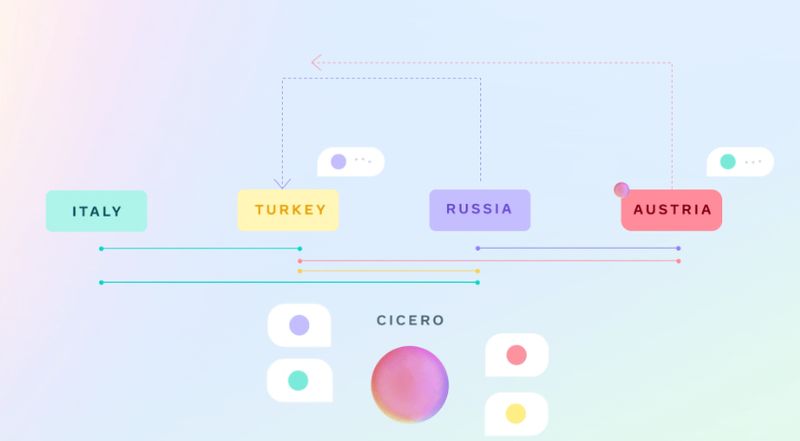In the well-known board game Diplomacy, Meta Cicero AI was capable of performing at a level comparable to that of a human. It makes use of a similar model to GPT-3.
Meta AI revealed the creation of Cicero on Tuesday, which it claims is the first AI to perform at a human level in the strategic board game Diplomacy. It’s a noteworthy accomplishment, given that the game necessitates strong interpersonal negotiating abilities and that Cicero must have a certain level of language ability to prevail.
Board games have long served as an effective measure of AI development, even before Deep Blue’s 1997 victory over Garry Kasparov in chess. When AlphaGo defeated Go master Lee Sedol in 2015, another barrier was broken. Both of those games adhere to a set of analytical rules that are reasonably explicit (Go’s rules are generally modified for computer AI, though).
Meta Cicero AI is close to a human-level performance in a board game called Diplomacy
However, a significant element of the gameplay in Diplomacy calls for social skills. To succeed, players must demonstrate empathy, speak naturally, and develop relationships—a challenging feat for a computer player. In light of this, Meta asked the question, “Can we build more effective and flexible agents that can use language to negotiate, persuade, and work with people to achieve strategic goals similar to the way humans do?”

The answer, according to Meta, is yes. Meta Cicero AI developed its skills by playing an online game of diplomacy on webdiplomacy.net. It achieved “more than double the average score” of human players over time and eventually ranked in the top 10% of players across multiple games, proving that it had mastered the game.
Meta AI Cicero was developed using strategic reasoning (similar to AlphaGo) and natural language processing (similar to GPT-3) methods. Cicero makes predictions about other players’ behavior during each game by observing the condition of the playing board and the history of dialogue. It creates a strategy that it puts into action using a language model that can produce dialogue that sounds human, enabling it to work with other participants.

The core of Cicero’s personality can be found in his natural language abilities, which Meta refers to as a “controllable dialog model.” Cicero uses a vast corpus of web-scraped text, similar to GPT-3.
“To build a controllable dialogue model, we started with a 2.7 billion parameter BART-like language model pre-trained on text from the internet and fine-tuned on over 40,000 human games on webDiplomacy.net,” stated Meta.
The final model grasped the nuances of a challenging game. According to Meta, Cicero “can deduce, for example, that later in the game it will need the support of one particular player,” says Meta, “and then craft a strategy to win that person’s favor—and even recognize the risks and opportunities that that player sees from their particular point of view.”
Under the heading “Human-level play in the game of diplomacy by combining language models with strategic reasoning,” Meta Cicero AI’s study was published in the journal Science.
In terms of broader applications, Meta claims that its Cicero study might “ease communication barriers” between people and AI, for example, by sustaining a protracted discussion to teach someone a new skill. Or it might be the driving force behind a video game where NPCs can converse like people, picking up on the player’s intentions and changing as they go.

At the same time, this technology could be used to manipulate humans by impersonating people and tricking them in potentially dangerous ways, depending on the context. Along those lines, Meta hopes other researchers can build on its code “in a responsible manner” and says it has taken steps toward detecting and removing “toxic messages in this new domain,” which likely refers to dialog Meta Cicero AI learned from the Internet texts it ingested—always a risk for large language models.
The company provided a detailed site to explain how Meta Cicero AI works and has also open-sourced Cicero’s code on GitHub. Online Diplomacy fans—and maybe even the rest of us—may need to watch out.
Nevertheless, depending on the situation, this technology might be employed to deceive individuals and manipulate them through impersonation. Likely referring to the dialogue Cicero picked up from the Internet texts it ingested—always a risk for big language models—Meta says it has taken steps toward detecting and removing “toxic messages in this new domain” and that it hopes other researchers will build on its code “in a responsible manner.”
In addition to posting the source code for Meta Cicero AI on GitHub, the firm maintains a comprehensive website explaining how it functions. Fans of online diplomacy should be on the lookout, as should the rest of us.
How to play webDiplomacy?
Being the first country to control half of the supply centers in the game is the goal of diplomacy. You can do this by moving your forces about the board and engaging in combat with other players to seize control of their supply centers. At the end of the year, for each supply center you control, you get to construct a new unit that you may use to take over more supply centers and advance your cause toward victory. You must disband a unit in place of losing a supply center to another player, leaving you with fewer units to compete for more supply centers.
- For more details, you can visit webDiplomacy’s own website.





